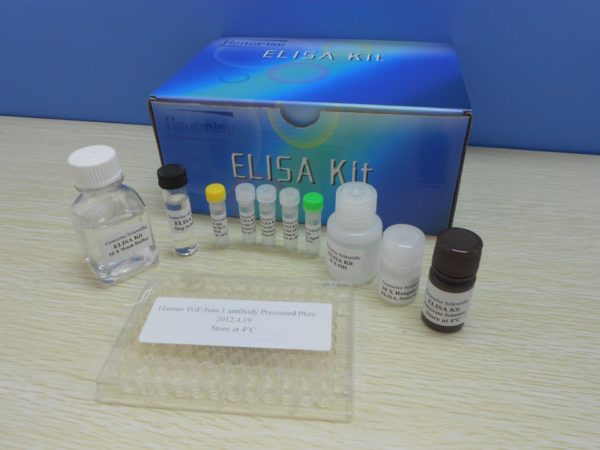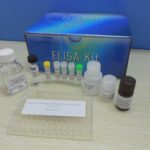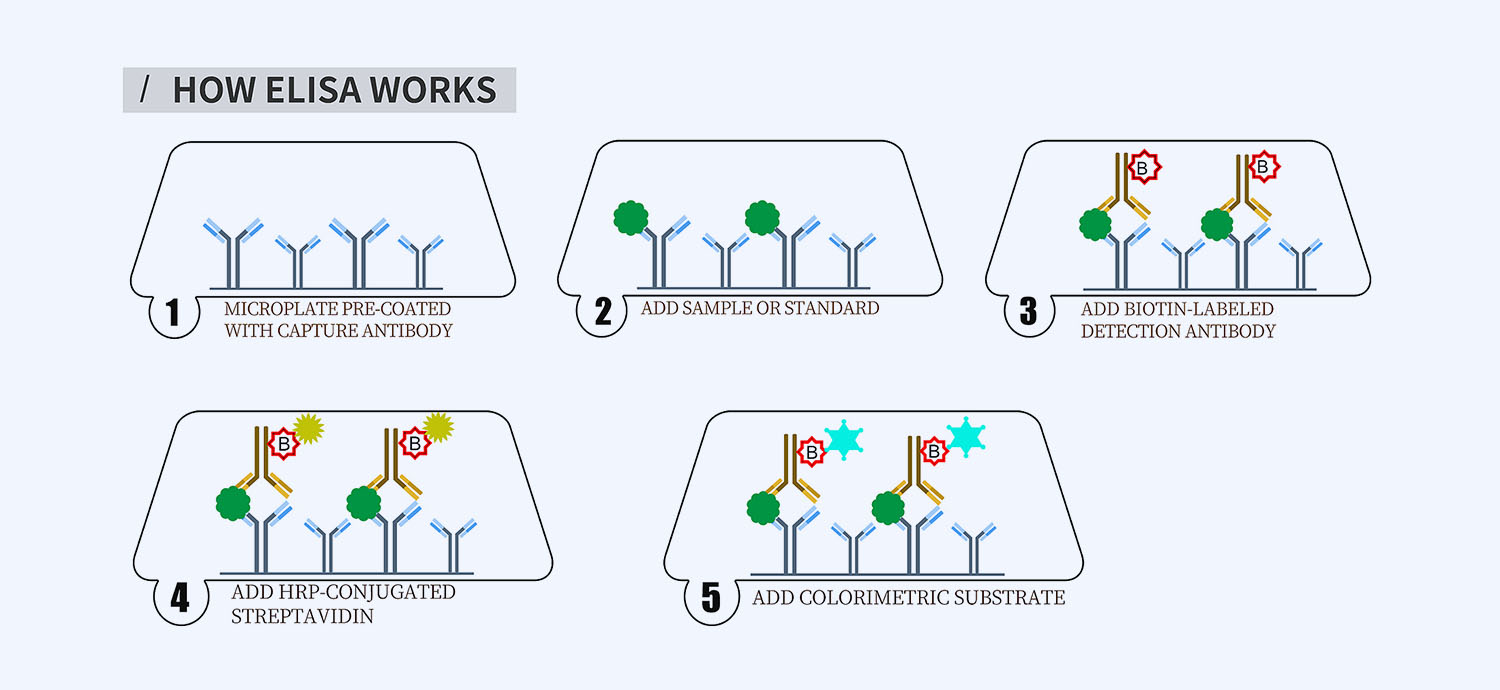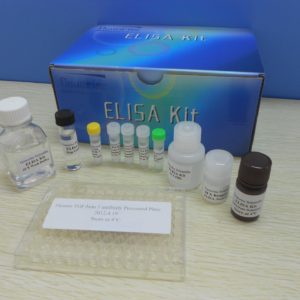Nori Human NT-proBNP ELISA Kit
$461.00 – $832.00
This ELISA kit is for quantification of NT-proBNP in human. This is a quick ELISA assay that reduces time to 50% compared to the conventional method, and the entire assay only takes 3 hours. This assay employs the quantitative sandwich enzyme immunoassay technique and uses biotin-streptavidin chemistry to improve the performance of the assays. An antibody specific for NT-proBNP has been pre-coated onto a microplate. Standards and samples are pipetted into the wells and any NT-proBNP present is bound by the immobilized antibody. After washing away any unbound substances, a detection antibody specific for NT-proBNP is added to the wells. Following wash to remove any unbound antibody reagent, a detection reagent is added. After intensive wash a substrate solution is added to the wells and color develops in proportion to the amount of NT-proBNP bound in the initial step. The color development is stopped, and the intensity of the color is measured.
Alternative names for NT-proBNP: N-terminal Brain natriuretic propeptide, NTproBNP
This product is for laboratory research use only, not for diagnostic and therapeutic purposes or any other purposes.
- Description
- How Elisa Works
- Product Citations
- Reviews (0)
Description
Nori Human NTproBNP ELISA Kit Summary
Alternative names for NT-proBNP: N-terminal Brain natriuretic propeptide, NTproBNP
| Assay Type | Solid Phase Sandwich ELISA |
| Format | 96-well Microplate or 96-Well Strip Microplate |
| Method of Detection | Colorimetric |
| Number of Targets Detected | 1 |
| Target Antigen Accession Number | na |
| Assay Length | 3 hours |
| Quantitative/Semiquantitative | Quantitative |
| Sample Type | Plasma, Serum, Cell Culture, Urine, Cell/Tissue Lysates, Synovial Fluid, BAL, |
| Recommended Sample Dilution (Plasma/Serum) | No dilution for sample <ULOQ; sufficient dilution for samples >ULOQ |
| Sensitivity | 156 pg/mL |
| Detection Range | 0.781-50 ng/mL |
| Specificity | Human NT-proBNP |
| Cross-Reactivity | < 0.5% cross-reactivity observed with available related molecules, < 50% cross-species reactivity observed with species tested. |
| Interference | No significant interference observed with available related molecules |
| Storage/Stability | 4 ºC for up to 6 months |
| Usage | For Laboratory Research Use Only. Not for diagnostic or therapeutic use. |
| Additional Notes | The kit allows for use in multiple experiments. |
Standard Curve
Kit Components
1. Pre-coated 96-well Microplate
2. Biotinylated Detection Antibody
3. Streptavidin-HRP Conjugate
4. Lyophilized Standards
5. TMB One-Step Substrate
6. Stop Solution
7. 20 x PBS
8. Assay Buffer
Other Materials Required but not Provided:
1. Microplate Reader capable of measuring absorption at 450 nm
2. Log-log graph paper or computer and software for ELISA data analysis
3. Precision pipettes (1-1000 µl)
4. Multi-channel pipettes (300 µl)
5. Distilled or deionized water
Protocol Outline
1. Prepare all reagents, samples and standards as instructed in the datasheet.
2. Add 100 µl of Standard or samples to each well and incubate 1 h at RT.
3. Add 100 µl of Working Detection Antibody to each well and incubate 1 h at RT.
4. Add 100 µl of Working Streptavidin-HRP to each well and incubate 20 min at RT.
5. Add 100 µl of Substrate to each well and incubate 5-30 min at RT.
6. Add 50 µl of Stop Solution to each well and read at 450 nm immediately.
Background:
Brain natriuretic peptide is a 32-amino acid polypeptide secreted by the ventricles of the heart in response to excessive stretching of cardiomyocytes. BNP is synthesized as a 134-amino acid preprohormone (preproBNP), encoded by the human gene NPPB.[1] Removal of the 25-residue N-terminal signal peptide generates the prohormone, proBNP, which is stored intracellularly as an O-linked glycoprotein; proBNP is subsequently cleaved between arginine-102 and serine-103 by a specific convertase into NT-proBNP and the biologically active 32-amino acid polypeptide BNP-32, which are secreted into the blood in equimolar amounts.[2] The release of BNP is modulated by calcium ions. BNP is secreted attached to a 76–amino acid N-terminal fragment in the prohormone called NT-proBNP (BNPT), which is biologically inactive. Once released, BNP binds to and activates the atrial natriuretic factor receptors NPRA, and to a lesser extent NPRB, in a fashion similar to atrial natriuretic peptide (ANP) but with 10-fold lower affinity. The biological half-life of BNP, however, is twice as long as that of ANP, and that of NT-proBNP is even longer, making these peptides better targets than ANP for diagnostic blood testing. The physiologic actions of BNP are similar to those of ANP and include decrease in systemic vascular resistance and central venous pressure as well as an increase in natriuresis. The net effect of these peptides is a decrease in blood pressure due to the decrease in systemic vascular resistance and, thus, afterload. Additionally, the actions of both BNP and ANP result in a decrease in cardiac output due to an overall decrease in central venous pressure and preload as a result of the reduction in blood volume that follows natriuresis and diuresis. A normal level BNP or NT-proBNP can rule out acute heart failure in the emergency setting. However, an elevated BNP or NT-proBNP should never be used to “rule in” acute or chronic heart failure in the emergency setting due to lack of specificity.[3] BNP and NT-proBNP are also typically increased in patients with left ventricular dysfunction, with or without symptoms (BNP accurately reflects current ventricular status, as its half-life is 20 minutes, as opposed to 1–2 hours for NT-proBNP).[4] Low BNP was found to be a predictor of survival to age 90 in men,[5] and BNP may be a reliable predictor of cardiovascular mortality in diabetics.[18]
References
- Sudoh T, et al. (1989) Biochem. Biophys. Res. Commun. 159 (3), 1427-1434.
- Schellenberger U, et al. (2006). Arch. Biochem. Biophys. 451 (2): 160–6.
- Maisel A, et a. (2002) N Engl J Med. 347 (3): 161–7.
- Atisha D, et al. (2004) Am. Heart J. 148 (3): 518–23.
- Nilsson, G; e tal. (2014) Healthy Aging Research. 3 (5): 1–10.
- Bhalla MA, et al. (2004). J. Am. Coll. Cardiol. 44 (5): 1047–52.




























Reviews
There are no reviews yet.